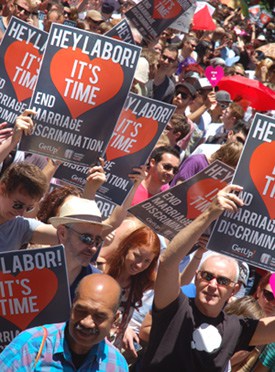Labor’s national conference saw a greater challenge to the government’s right-wing policies than at the previous event in 2009, where then leader Kevin Rudd orchestrated proceedings to ensure there was no debate. But the overall result was that Julia Gillard forced through a further shift to the right—and did nothing to boost Labor’s prospects.
There was a small victory around same-sex marriage—with the homophobic and most right-wing elements in the party losing their battle to keep support for it out of the Labor platform.
This showed that the political momentum is all on the side of allowing same-sex marriage. Up to 10,000 people marched on the conference on Saturday demanding that Labor support it.
 But Gillard ensured that changing the Labor platform would not deliver same-sex marriage rights, by demanding Labor MPs be allowed to ignore the new party policy and have a “conscience vote” on the issue in parliament. Tony Abbott has ruled out allowing Liberal MPs a conscience vote, so the numbers to pass same-sex marriage into law do not exist in parliament.
But Gillard ensured that changing the Labor platform would not deliver same-sex marriage rights, by demanding Labor MPs be allowed to ignore the new party policy and have a “conscience vote” on the issue in parliament. Tony Abbott has ruled out allowing Liberal MPs a conscience vote, so the numbers to pass same-sex marriage into law do not exist in parliament.
Not only did this mean Gillard lining up with the most right-wing elements inside her party, it puts her in the embarrassing position of having to vote against same-sex marriage when it is introduced for a parliamentary debate.
This stance is hardly going to make Gillard look like she stands for anything, or win people back to Labor.
The government’s anti-refugee policies were challenged on conference floor by Labor for Refugees and members of the Left faction. Outside 500 people rallied for refugee rights on the Sunday.
But in the end Labor took another step to the right, entrenching offshore processing in party policy for the first time. This brings policy into line with the government’s planned Malaysia refugee swap deal. As textile union secretary Michele O’Neil put it, this was, “to reward the government for ignoring the current platform.”
After the conference, Immigration Minister Chris Bowen made clear his determination to re-introduce the Malaysia deal to parliament, in the hope of getting it through the lower house now that Labor has secured an extra vote with the defection of Liberal MP Peter Slipper.
This will be nothing more than a political stunt to try to outbid Tony Abbott on who can be “tougher” on refugees, as any legislation will still fail in the Senate, as long as the Coalition remains opposed to the Malaysia Agreement. But it shows that the Labor leadership’s efforts to race Abbott to the right over refugees are not going to let up.
Julia Gillard’s other notable move at the conference was to overturn Labor’s opposition to selling uranium to India, which has not signed the Non-Proliferation Treaty. This was one of the last vestiges of Labor’s anti-nuclear policy won by the anti-nuclear movement in the late 1970s.
Gillard first announced she would move the change on the eve of the visit of US President Barack Obama, signalling that it was designed to boost US interests. India is emerging as a key US ally in Asia, as it seeks to contain the rise of China.
But there was continued opposition to the government’s plan to impose a nuclear waste dump on Aboriginal land at Muckaty station in the NT. A fringe meeting heard from Muckaty traditional owner Dianne Stokes and lawyer George Newhouse, who is running a legal challenge to the plan.
A number of conference delegates and union officials packed into another meeting “The case against the NT Intervention”, hosted by the CFMEU.
Reforming Labor
With Labor still running at near record lows of around 30 per cent primary vote in the polls, and continuing to haemorrhage members, there has been plenty of talk about the need to “reform” Labor.
Party elder John Faulkner repeated his earlier warnings about the state of the party, telling a meeting during the conference: “The situation is now dire. Our party is in decline. Our membership is small and getting smaller. Our membership is old and getting older.”
But the conference failed to agree even on any of the major organisational changes that emerged from its review following last year’s federal election. The details have been shunted to an “implementation committee”.
However these changes to how delegates get elected to Labor’s conference will not solve the party’s problems. It is the determination of the party leadership to shift to the right that has shattered Labor’s membership and support base. Under Gillard this is continuing unchecked.
The fight inside Labor to change party policy does have an importance. A serious fight by rank-and-file members and the unions is capable of disciplining the MPs, as we saw over power privatisation in NSW. But Labor policy is also habitually ignored by Labor governments.
It is the fight outside Labor, on the streets and in the workplaces, that can really shift politics. The fight inside Labor can be the first step towards such a struggle outside for those that look to the party.
The Labor conference carried a resolution condemning the Qantas boss Alan Joyce grounding the airline, but without industrial action in defiance of Fair Work Australia, the resolution will be meaningless.
The campaigns to force change over refugees and same-sex marriage will have to continue. Most importantly we need a union fightback. Instead of simply looking to lobby the Labor leadership inside the party over Labor’s FairWork laws or the ABCC, unions need to build on the struggles at Baiada or by the Victorian nurses to defy Labor’s work laws and win change. This is the only way Labor’s race to the right will be halted.




